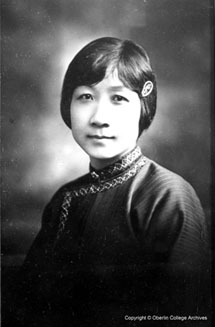Biographies
H. H. Kung | Mark Wu | Lan-Hua Liu | More
Lan-Hua Liu
by Aly Halpert, Student Project Assistant

Lan-Hua Liu was born in Taigu, Shanxi on May 30th, 18941 , to father Hsieh-Kung Lui and mother Ching Chen Chang. She was the granddaughter of Deacon Liu Fengzhi, a prominent businessman converted to Christianity by American missionaries. Fengzhi, most likely the first to be baptized by the Oberlin Band, was recognized as the leader of the Taigu Christians and was killed in the Boxer Rising along with Lan-Hua’s mother. After the rebellion, Lan-Hua, her siblings, and grandmother spent the winter in an old temple, eating however much they could beg. They wore only the summer clothes they had on when the Boxers came.2 Finally, American missionaries gave the family money and took Lan-Hua to Peking to attend school. An excellent student, Lan-Hua came back to Taiku to teach at Ming Hsien for two years before attending Yen Ching College and graduating in 1917. Lan-Hua left China to attend Oberlin College, from which she graduated in 1925. At the time of her graduation, Shansi appointed her principal of the Girls’ school in China, called Beilu.
Before returning to China, Oberlin sponsored Lan-Hua to get her MA at the Columbia Teacher’s College in New York. There, in International House, she met Sing Ching Yui, a former chaplain in the army of Marshal Feng Yu Hsiang, and faculty member of the political training institute at Kaifeng, Honan.3 Lan-Hua Liu and Sing Ching Yui married on July 15, 1928. 4 Later, the two had a daughter, Hua Ching. “One of the campus flowers,” Hua Ching died at age three.5
In 1928, Lan-Hua “oversaw the merger of the girls’ school with Ming Hsien to form the first co-educational school in Shanxi”. As a principal, Lan-Hua was committed to an equal education for women. In a letter to Mr. Bohn at Oberlin on April 26, 19296 , Lan-Hua resigned from Ming Hsien schools, ostensibly because there were no plans to build a senior high school for girls. Bohn wrote back to Lan-Hua that her resignation “came to us like a bolt from the blue… We are still rather at a loss to know what is really in your mind.” 7 Bohn wrote several more times begging her to stay with the schools, but she did not respond. Post-Ming Hsien, Lan Hua became the Dean of Women at Cheeloo University in Tsinan, Shantung.
Later, Lan-Hua returned to the United States to tour at universities. Bohn heard of Liu’s arrival in the states for a tour, and reminded her in a letter that “You remember, dear, that you were the first woman representative sent out by our Association to Ming Hsien. We took great pride and satisfaction in your fine work there, and never ceased to mourn that events so shaped themselves that you are not there today.”8 Lan-Hua responded and finally returned to Oberlin to speak about her experiences for Shansi Day.
Sources:
1. Student files, Lan Hua Yui, Oberlin College Archives
2. Liu Lan Hua biography, Lan Hua Liu Correspondence, 1926-1938, Oberlin College Archives
3. Student files, Lan Hua Yui, Herald, Feb. ? Oberlin College Archives
4. Student files, Lan Hua Yui, Tribune, Sept. 14, 1928, Oberlin College Archives
5. Student files, Lan Hua Yui, March 1, 1935 newsletter, Oberlin College Archives
6. Liu to Bohn, April 26, 1929. Lan Hua Liu Correspondence, 1926-1938, Oberlin College Archives
7. Bohn to Liu, June 5, 1929. Lan Hua Liu Correspondence, 1926-1938, Oberlin College Archives
8. Bohn to Liu, August 28, 1936. Lan Hua Liu Correspondence, 1926-1938, Oberlin College Archives